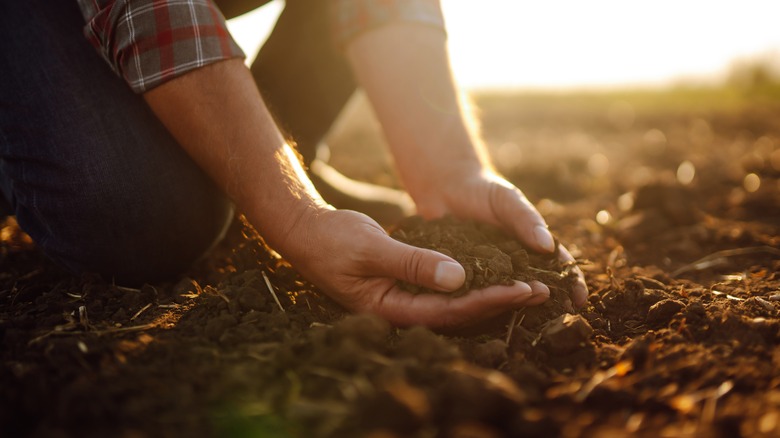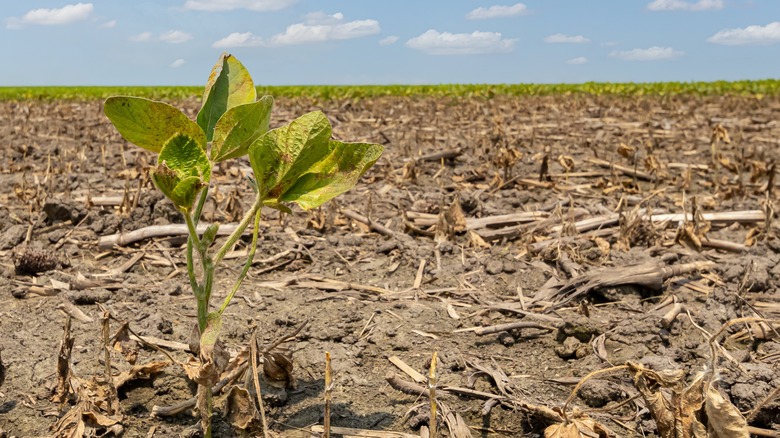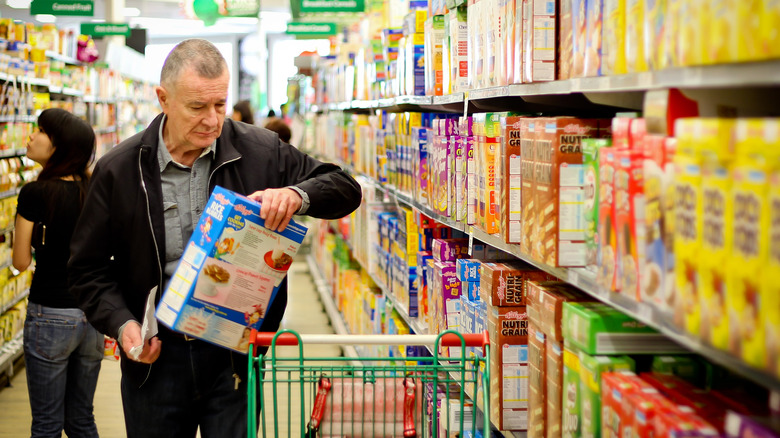Why US Farmers Say Food Prices Will Likely Continue To Rise
To say the world has been turned upside down since the end of the coronavirus pandemic might seem like an understatement, especially since we're seeing inflation at levels not seen in decades on top of supply chain shocks. Let's not forget about the war that has compromised global food supplies. As a result, we're all having to pay more for everything, everywhere: from gas to groceries.
And while we might think that farmers are immune to the havoc seen in the global supply chain, know that they've experienced as much sticker shock as we have, because the higher price of fertilizer, weed killers, equipment maintenance, and seasonal help have all done their collective part to eat up profits — so farmers may only have enough to get by this year, per The Wall Street Journal.
As NPR put it, "the numbers aren't pretty." One farmer says the cost of fertilizer has almost tripled — from $6,000 to $16,000. The price of diesel to run tractors has gone from $27,000 to $66,750. "Everybody's sweating right now because we don't know what's going to happen. And we're all trying to do the best that we can — cut corners, cut cost — to survive it." New Mexico farmer Don Hartman says.
Farmers are dealing with the effects of climate change
To try and help American farms along, the Biden administration has poured money into initiatives like producing more fertilizer domestically and giving farmers the technical means through which they might be able to cut their dependence on fertilizer, per CNN.
It might be easier if all America's farmers were facing were record inflation and a squeeze in the supply chain, because the government can't mitigate the impact of climate change. CNN reports that thanks to climate change, 71 million crop acres that stretch out "from the Great Plains to the Pacific" are going through a severe drought that's affecting about 22% of United States crops, while planting has been delayed in the Midwest which is seeing record amounts of rainfall.
Purdue University agricultural economist Jayson Lusk says: "Those drought impacts are going to result in less food being on the market, which is going to further put pressure on food prices on top of some of the inflationary pressures we've already been seeing." And if consumers think they're going to get some reprieve, California Polytechnic State University agricultural economist Ricky Volpe says: "I don't know if we've seen the impacts of these supply problems, but they're coming...If we were hoping for inflation to significantly abate by the end of the year, this is probably pushing the clock back a few months on that."
Not everyone stands to lose this environment
Unfortunately, it will be difficult to imagine farmers being able to reap financial rewards in exchange for their hard work. Environmental Working Group's agricultural economist Anne Schechinger tells NPR that: "The share of a food dollar that a farmer gets is so small that when, you know, we're seeing these prices of food go up in the grocery store, that doesn't necessarily mean, you know, farmers are really getting any more money for their own products."
It should tell us that while both the consumers and the food producers are getting squeezed, food conglomerates in the middle are reporting record profits. Case in point: cereal producer Kellogg Company, which, per Bakery and Snacks, saw a 15% increase in earnings, and a profit of $424 million in the business quarter ending in April. In spite of this, Kellogg CEO Steve Cahillane said there is a possibility that cereal prices will go up, because "Ultimately, in an environment like this, which clearly we haven't seen in 40 years, we aren't going to be able to just not pass prices through to consumers...Productivity just simply can't cover this type of inflation."


